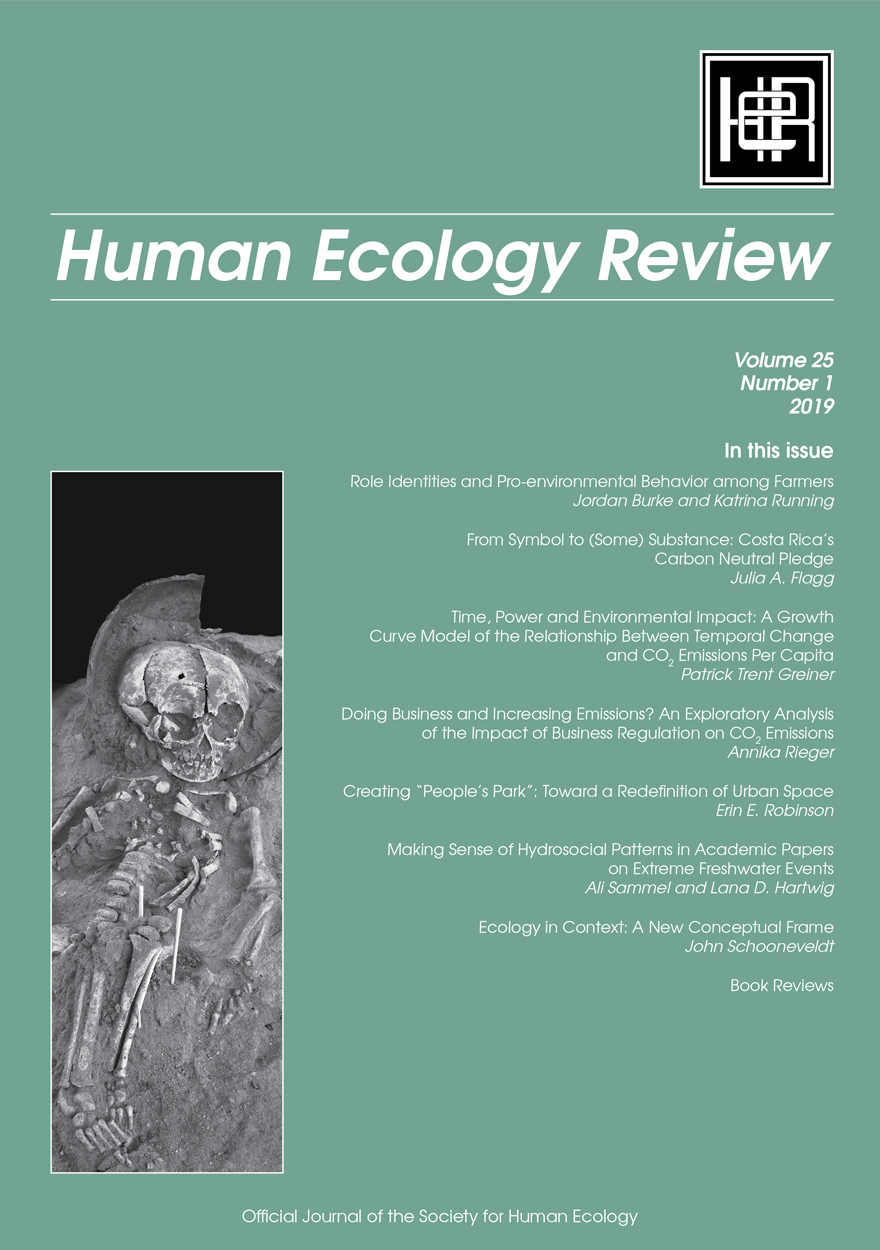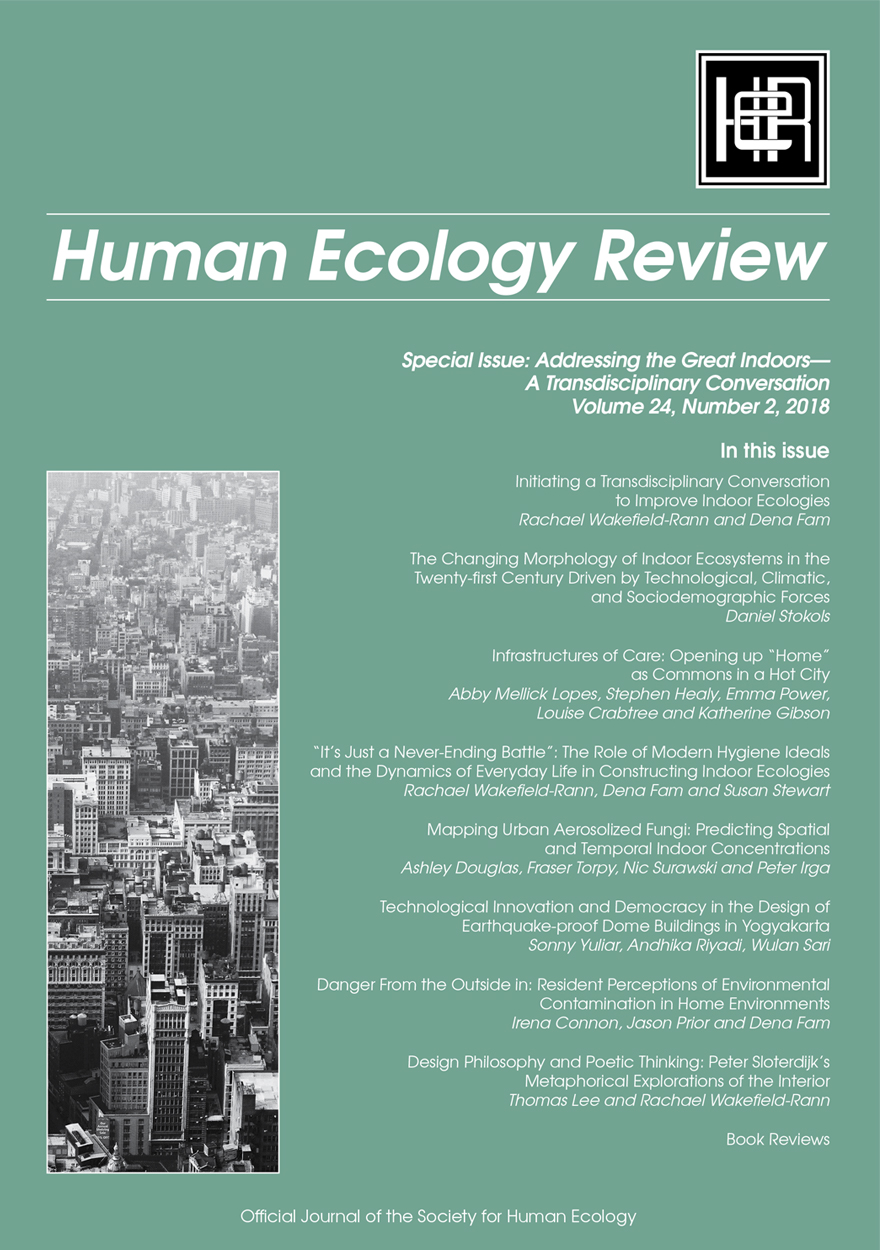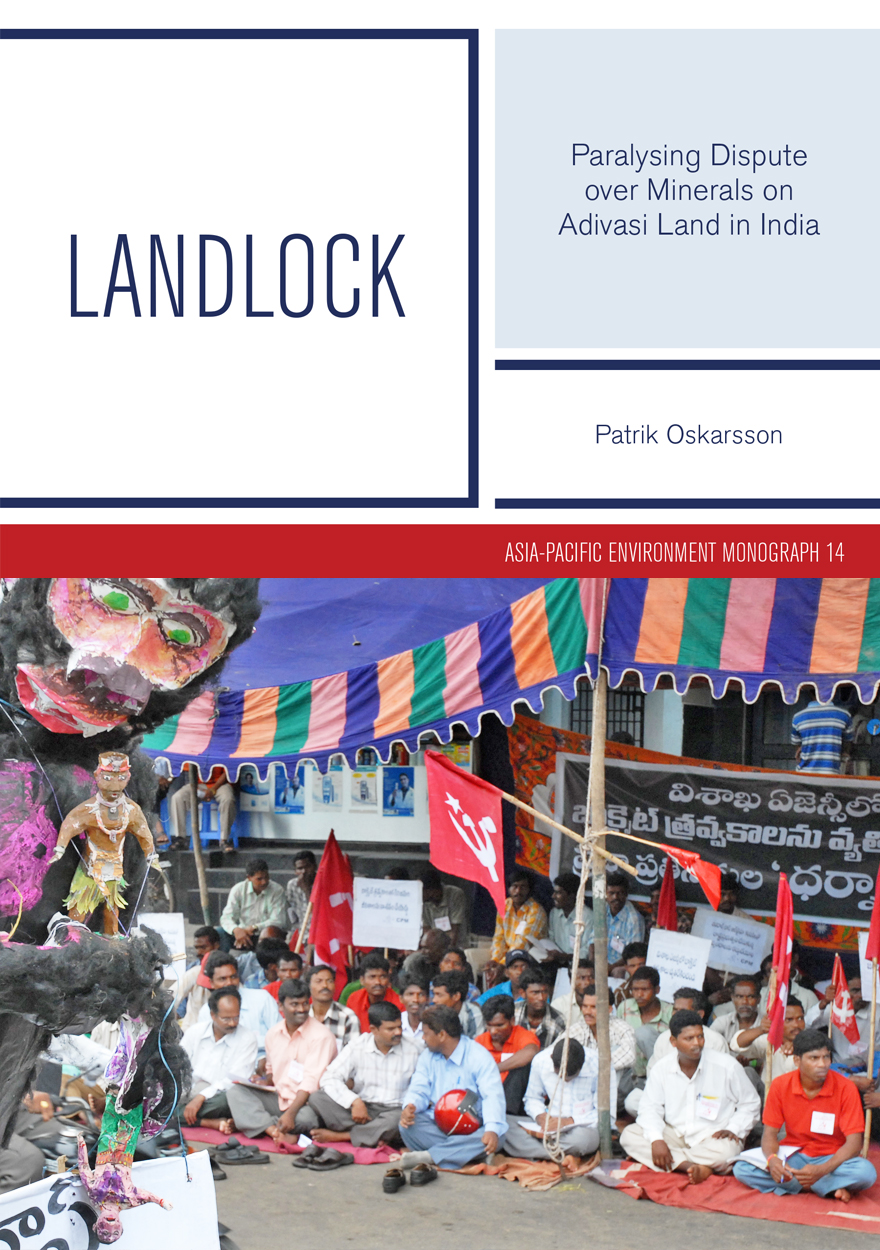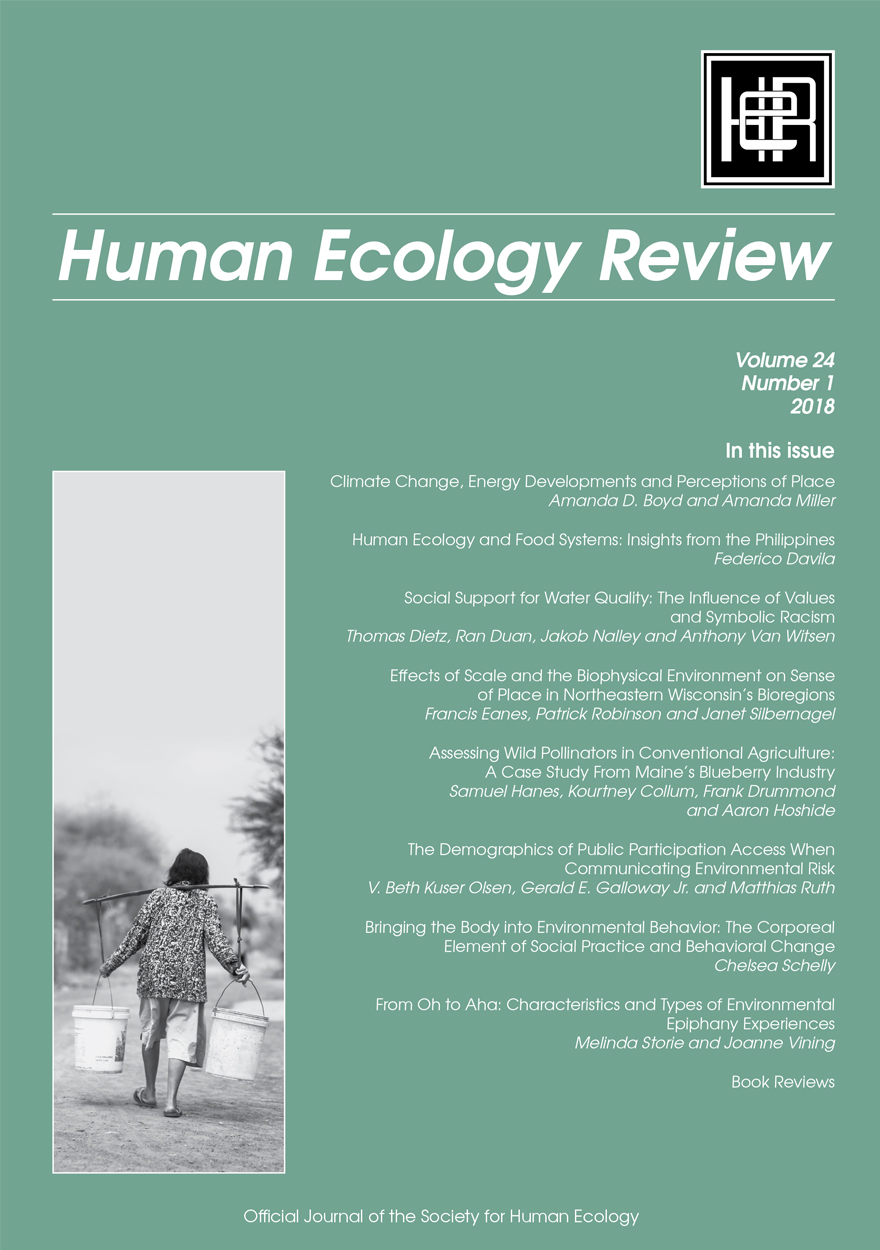Search titles
Displaying results 31 to 40 of 152.

Human Ecology Review: Volume 25, Number 1 »
Publication date: August 2019
Human Ecology Review is a semi-annual journal that publishes peer-reviewed interdisciplinary research on all aspects of human–environment interactions (Research in Human Ecology). The journal also publishes essays, discussion papers, dialogue, and commentary on special topics relevant to human ecology (Human Ecology Forum), book reviews (Contemporary Human Ecology), and letters, announcements, and other items of interest (Human Ecology Bulletin). Human Ecology Review also publishes an occasional paper series in the Philosophy of Human Ecology and Social–Environmental Sustainability.
Download for free
Not available for purchase

Gobernanza y gestión de áreas protegidas »
Publication date: August 2019
Gobernanza y gestión de áreas protegidas presenta un compendio de texto original, estudios de caso y ejemplos de todo el mundo, a partir de la literatura, el conocimiento y la experiencia de las personas involucradas en áreas protegidas. El libro sintetiza el conocimiento actual y el pensamiento de vanguardia de las diversas ramas de la práctica y el aprendizaje relevantes para la gestión y el gobierno de estas zonas. Se pretende que sea una inversión en las habilidades y competencias de las personas responsables de tal tarea y, en consecuencia, la gobernanza y la gestión efectivas, ahora y en el futuro.
El éxito global del concepto de área protegida radica en su visión compartida de proteger el patrimonio natural y cultural a largo plazo, y organizaciones como la Unión Internacional para la Conservación de la Naturaleza son una fuerza unificadora en este sentido. No obstante, las áreas protegidas son un fenómeno sociopolítico y las formas en que las naciones las entienden, las gobiernan y las manejan siempre están abiertas a disputas y debates. El libro pretende ilustrar, educar y, sobre todo, desafiar a los lectores a pensar profundamente sobre las áreas protegidas, su futuro y su pasado, así como su presente.
El libro ha sido compilado por 169 autores y trata todos los aspectos de la gobernanza y gestión de áreas protegidas. Proporciona información para apoyar la capacitación en desarrollo de capacidades de los oficiales de campo, gerentes a cargo y gerentes de nivel ejecutivo.

A Memory of Ice »
The Antarctic Voyage of the Glomar Challenger
Authored by: Elizabeth Truswell
Publication date: August 2019
In the southern summer of 1972/73, the Glomar Challenger was the first vessel of the international Deep Sea Drilling Project to venture into the seas surrounding Antarctica, confronting severe weather and ever-present icebergs.
A Memory of Ice presents the science and the excitement of that voyage in a manner readable for non-scientists. Woven into the modern story is the history of early explorers, scientists and navigators who had gone before into the Southern Ocean. The departure of the Glomar Challenger from Fremantle took place 100 years after the HMS Challenger weighed anchor from Portsmouth, England, at the start of its four-year voyage, sampling and dredging the world’s oceans. Sailing south, the Glomar Challenger crossed the path of James Cook’s HMS Resolution, then on its circumnavigation of Antarctica in search of the Great South Land. Encounters with Lieutenant Charles Wilkes of the US Exploring Expedition and Douglas Mawson of the Australasian Antarctic Expedition followed. In the Ross Sea, the voyages of the HMS Erebus and HMS Terror under James Clark Ross, with the young Joseph Hooker as botanist, were ever present.
The story of the Glomar Challenger’s iconic voyage is largely told through the diaries of the author, then a young scientist experiencing science at sea for the first time. It weaves together the physical history of Antarctica with how we have come to our current knowledge of the polar continent. This is an attractive, lavishly illustrated and curiosity-satisfying read for the general public as well as for scholars of science.

International Review of Environmental History: Volume 5, Issue 1, 2019 »
Edited by: James Beattie
Publication date: May 2019
International Review of Environmental History takes an interdisciplinary and global approach to environmental history. It encourages scholars to think big and to tackle the challenges of writing environmental histories across different methodologies, nations, and time-scales. The journal embraces interdisciplinary, comparative and transnational methods, while still recognising the importance of locality in understanding these global processes.
The journal's goal is to be read across disciplines, not just within history. It publishes on all thematic and geographic topics of environmental history, but especially encourage articles with perspectives focused on or developed from the southern hemisphere and the ‘global south’.
Download for free
Not available for purchase

Human Ecology Review: Volume 24, Number 2 »
Special Issue: Addressing the Great Indoors — A Transdisciplinary Conversation
Publication date: December 2018
Human Ecology Review is a semi-annual journal that publishes peer-reviewed interdisciplinary research on all aspects of human–environment interactions (Research in Human Ecology). The journal also publishes essays, discussion papers, dialogue, and commentary on special topics relevant to human ecology (Human Ecology Forum), book reviews (Contemporary Human Ecology), and letters, announcements, and other items of interest (Human Ecology Bulletin). Human Ecology Review also publishes an occasional paper series in the Philosophy of Human Ecology and Social–Environmental Sustainability.
Download for free
Not available for purchase

The Promise of Prosperity »
Visions of the Future in Timor-Leste
Edited by: Judith Bovensiepen
Publication date: December 2018
For the people of Timor-Leste, independence promised a fundamental transformation from foreign occupation to self-rule, from brutality to respect for basic rights, and from poverty to prosperity. In the eyes of the country’s political leaders, revenue from the country’s oil and gas reserves is the means by which that transformation could be effected. Over the past decade, they have formulated ambitious plans for state-led development projects and rapid economic growth. Paradoxically, these modernist visions are simultaneously informed by and contradict ideas stemming from custom, religion, accountability and responsibility to future generations. This book explores how the promise of prosperity informs policy and how policy debates shape expectations about the future in one of the world’s newest and poorest nation-states.

Atlas of Butterflies and Diurnal Moths in the Monsoon Tropics of Northern Australia »
Authored by: M.F. Braby, D.C. Franklin, D.E. Bisa, M.R. Williams, A.A.E. Williams, C.L. Bishop, R.A.M. Coppen
Publication date: December 2018
Northern Australia is one of few tropical places left on Earth in which biodiversity—and the ecological processes underpinning that biodiversity—is still relatively intact. However, scientific knowledge of that biodiversity is still in its infancy and the region remains a frontier for biological discovery. The butterfly and diurnal moth assemblages of the area, and their intimate associations with vascular plants (and sometimes ants), exemplify these points.
However, the opportunity to fill knowledge gaps is quickly closing: proposals for substantial development and exploitation of Australia’s north will inevitably repeat the ecological devastation that has occurred in temperate southern Australia—loss of species, loss of ecological communities, fragmentation of populations, disruption of healthy ecosystem function and so on—all of which will diminish the value of the natural heritage of the region before it is fully understood and appreciated. Written by several experts in the field, the main purpose of this atlas is to compile a comprehensive inventory of the butterflies and diurnal moths of northern Australia to form the scientific baseline against which the extent and direction of change can be assessed in the future. Such information will also assist in identifying the region’s biological assets, to inform policy and management agencies and to set priorities for biodiversity conservation.
In the media
Read the IFL Science article: Incredible Butterfly And Moth Diversity Hotspot Discovered In Northern Australia.
Read the Fairfax article: Butterfly 'detective' solves 120-year-old north Australian mystery.

Landlock »
Paralysing Dispute over Minerals on Adivasi Land in India
Authored by: Patrik Oskarsson
Publication date: September 2018
Landlock: Paralysing Dispute over Minerals on Adivasi Land in India explores the ways in which political controversy over a bauxite mining and refining project on constitutionally protected tribal lands in Andhra Pradesh descended into a state of paralysis where no productive outcome was possible. Long-running support for Adivasi (or tribal) land rights motivated a wide range of actors to block the project’s implementation by recourse to India’s dispersed institutional landscape, while project proponents proved adept in proposing workarounds to prevent its outright cancellation. In the ensuing deadlock, the project was unable to move towards completion, while marginalised Adivasi groups were equally unable to repossess their land. Such a ‘landlock’ is argued to be characteristic of India’s wider inability to deal with conflicts over land matters, despite the crucial importance of land for smallholder livelihoods and various economic processes in an intensely growth-focused country. The result has been frequent yet grindingly slow processes of contestation in which powerful business and state interests are, at times, halted in their tracks, but mostly seem able to slowly exhaust local resistance in their pursuit of large-scale projects that produce no benefits for the rural poor.

Human Ecology Review: Volume 24, Number 1 »
Publication date: September 2018
Human Ecology Review is a semi-annual journal that publishes peer-reviewed interdisciplinary research on all aspects of human–environment interactions (Research in Human Ecology). The journal also publishes essays, discussion papers, dialogue, and commentary on special topics relevant to human ecology (Human Ecology Forum), book reviews (Contemporary Human Ecology), and letters, announcements, and other items of interest (Human Ecology Bulletin). Human Ecology Review also publishes an occasional paper series in the Philosophy of Human Ecology and Social–Environmental Sustainability.
Download for free
Not available for purchase

International Review of Environmental History: Volume 4, Issue 2, 2018 »
Edited by: James Beattie
Publication date: September 2018
International Review of Environmental History takes an interdisciplinary and global approach to environmental history. It encourages scholars to think big and to tackle the challenges of writing environmental histories across different methodologies, nations, and time-scales. The journal embraces interdisciplinary, comparative and transnational methods, while still recognising the importance of locality in understanding these global processes.
The journal's goal is to be read across disciplines, not just within history. It publishes on all thematic and geographic topics of environmental history, but especially encourage articles with perspectives focused on or developed from the southern hemisphere and the ‘global south’.
Download for free
Not available for purchase



